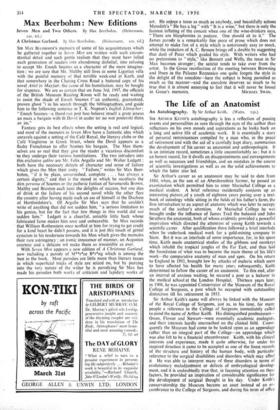Max Beerbohm: New Editions
A Christmas Garland. By Max Beerbohm. (Heinemann. los. 6d.) SIR MAX BEERBOHM'S memoirs of some of his acquaintances which he gathered together in Seven Men are written with such circum- stantial detail and such gentle realism that they must have lulled each generation of readers into abandoning disbelief, into refusing to accept Mr. Enoch Soames as a character of the mere imagina- tion; we are sure that Mr. Maltby still lives in some Ligurian villa with the painful memory of that terrible week-end at Keeb, and that somewhere in the Charing Cross Road a battered copy of his novel Ariel in Mayfair. the cause of his humiliation, may be bought for sixpence. We are as certain that on June 3rd, 1997, the officials of the British Museum Reading Room will be ready and waiting to assist the shade of Enoch Soames (" an authentic, guaranteed, proven ghost ") in his search through the bibliographies, and guide him to the following sentence in T. K. Nupton's Inglish Littracher: "Enoch Soames—a thurd-rait poit hoo beleevz imself a grate jeneus an maix a bargain with th Devvl in auder ter no wot posterriti thinx ov Fantasy gets its best effects when the setting is real and logical, and most of the memoirs in Seven Men have a fantastic idea which unravels against a setting of the Café Royal, the literary clubs or the Café Vingtierne in Greek Street, where the Devil appears as a flashy Frenchman to offer Soames his bargain. The Men them- selves are so real that they give the reader a vicarious discomfort -as they undergo their various humiliations. The two intruders into this exclusive galere are Mr. Felix Argallo and Mr. Walter Ledgett ; both have the necessary defects of character and sense of failure which gives the Men their unity. "Failure," writes Sir Max Beer- bohm, "if it be plain, unvarnished, complete . . . has always a certain dignity," and that is the mood in which he recollects the dim persona of Soames or the pathetic fustian of Savonarola Brown. Maltby and Braxton each taste the delights of success, but one dies of drink at the failure of his second novel while the other flees the country after having made such an ass of himself at the Duchess of Hertfordshire's. Of Argallo Sir Max says that he couldn't write of anything that did not sadden him, "a serious limitation to his genius, but for the fact that few things in this world did not sadden him." Ledgett is a cheerful, amiable little hack whose fabricated fame makes him sour and unbearable. Sir Max records that William Rothenstein once scoffed at him for trying to get credit for a kind heart he didn't possess, and it is just this touch of genial cynicism in his tenderness towards his Men which gives the memoirs their rare astringency ; an ironic innocence of manner, an Augustan courtesy and a delicate wit make them as irresistible as ever. With Seven Men appears a new edition of A Christmas Garland. now including a parody of M**r*ce B*r*ng which is among the best in the book. Most parodies are little more than literary teases in which superficial tricks ot style are seized on, but by piercing into the very nature of the writer he is parodying Sir Max has made his parodies both works of criticism and lapidary works of
art. He enjoys a tease as much as anybody, and beautifully echoes Meredith's "He has a leg" with "It is a wine," but there is only the faintest inflating of the conceit when one of the wine-drinkers says, "There are blasphemies in posture. One should sit to it." The James parody is a remarkably fine piece of prose which does not attempt to make fun of a style which is notoriously easy to mock, while the imitation of A. C. Benson brings off a double by suggesting that dash of Pater which guided his style. With writers who had no pretensions to "style," like Bennett and Wells, the tease in Sir Max becomes stronger ; the satirist tends to take over from the artist. In the Gosse recollection of the meeting between Browning and Ibsen in the Palazzo Rezzonico one quite forgets the style in the delight of the anecdote—here the subject is being parodied as much as the manner—and the anecdote deserves so much to be true that it is almost annoying to feel that it will never be found


































 Previous page
Previous page